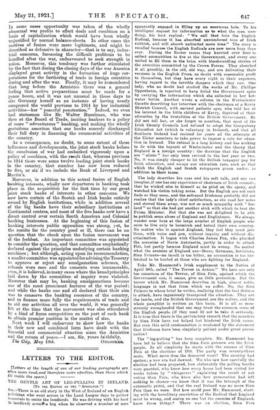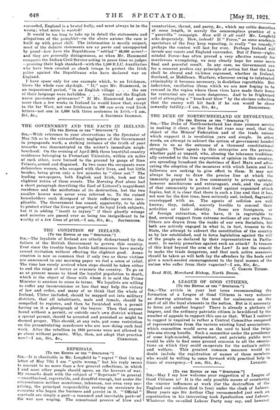LETTERS TO THE EDITOR.
[Letters of the length of one of our leading paragraphs are. often more read,and therefore more effective, than those which fill treble the space.] TEE GENTLE ART OF LEG-FULLING IN IRELAND. (To THE EDITOR OF THE SPECTLTOR."3 Sin.—There is an old story in the West of. Ireland of an English politician who went across in the Land League days to gather materials to smite the landlords. He was driving with his host (a landlord) acrosilka bog when he observed a number of men apparently engaged in filling up an enormous hole. To his intelligent request for information as to what the men were doing, his host replied: " We call that hole the English Radical, because It has absorbed unnumbered tons of Irish rubbish, and will absorb unlimited more tons." The story is recalled because the English Radicals are now more busy than ever. During the Easter recess they hurried over here to collect ammunition to fire at the Government, and every one united to fill them to the brim with blood-curdling stories of the atrocities committed by the Crown Forces. They absorbed it all greedily, in the old, old way, and are delivering their versions in the English Press, no doubt with reasonable profit to themselves, but they have every right to their expenses, having regard to the terrible dangers which they ran. One lady, who no doubt had studied the works of Mr. Phillips Oppenheim, is reported to have foiled the Government spies by carrying the information which she collected in her hot- water bottle. Another wrote a column in the Westminster Gazette describing her interview with the chairman of a Kerry District Council, with earnest pathetic eyes, who told her of his interest in the little children of Kerry, deprived of their education by the brutalities of the British Government. He did not tell her, or she forgot to mention, that most of the Irish County Councils had refused to adopt the Compulsory Education Act (which is voluntary in Ireland), and that all Southern Ireland had resisted for years all the attempts of the Ulster members to take power to impose a rate for educa- tion in Ireland. The refusal is a long history and has nothing to do with the boycott of Westminster and the theory that England is a foreign country : the doctrine that the English are " aliens " has only been revived in the last year or two. No, it was simply cheaper to let the British taxpayer pay for Irish education, and escape our education rate, such as that which the English and Scotch ratepayers groan under, in addition to their taxes.
The lady describes his eyes and his soft talk, and one can imagine, if one has any experience of chairmen of Irish councils, that he winked also to himself as he, piled on the agony, and watched his victim taking notes. But the English are not such fools as they seem, and the soft-eyed Irishman probably did not realize that the lady's chief satisfaction, as she read her notes and stowed them away, was not so much sympathy with " Ire- land" as that she had got another stick with which to beat the Prime Minister. Not that she was not delighted to be able to publish some abuse of England and Englishmen. We always wonder over hate at the large number of English people who seem to live only to besmirch and befoul their own country. No matter who is against England, they feel they must join them, with voice and pen, without inquiry and without dis- crimination. It began with Charles James Fox, who glorified the assassins of Marie Antoinette, partly in order to attack Pitt, but partly because England must be wrong. No matter what the enemies of England are—Boers, Germans, Sovietists, Sinn Feiners—no insult is too bitter, no accusation is too far- fetched to be hurled at those who are fighting for England.
Take Mr. Hammond's Irish supplement to the Nation of April 30th, called " The Terror in Action." We here are only too conscious of the Terror, of Sinn Fein, against which the Government can, it seems, give us little protection. But the terror which Mr. Hammond describes in high, almost noble. language is not that from which we suffer. No, the Sinn Feiners to whose brief he writes, realizing that the best defence is attack, have ingeniously transposed the situation. They are the lambs, and the British Government are the wolves, and the whole pamphlet is written on this basis. It is all so mon- strously wrongheaded that one may trust the common sense of the English people. (if they read it) not to take it seriously. It is true that there is the perfunctory remark that the murders by Sinn Fein have not helped but hindered the Irish cause. But even this mild condemnation is weakened by the statement that Irishmen have been singularly patient under great provo- cation!
The "leg-pulling" has been complete. Mr. Hammond has been led to believe that the Sinn Fein gunmen are the Irish people. In all simplicity he starts with the success of Sinn Fein at the elections of 1918. The party won seventy-three seats. What more does the democrat want? The country had spoken; a new era had dawned. We who saw how carefully the election had been prepared, how elaborately the polling booths were guarded, who knew how every house had been visited for weeks before by " whisperers " explaining the result of not voting Sinn Fein, who knew also how personation had left nothing to chance—we know that it was the triumph of the automatic pistol, and that the real Ireland was no more Sinn Fein than we were. But how could poor Mr. Hammond, start- ing with the hereditary conviction of the Radical that England must be wrong, and seeing no one but the enemies of England. know these things ? There was an election, Sinn Fein
succeeded, England is a brutal bully, and must always be in the wrong; what more is wanted?
It would be too long to take up in detail the statements and allegations of the pamphlet—on the above axioms the case is built up with great skill. The information is mostly suspect, most of the definite statements are ex parte and unsupported by proof—how have the Republicans "settled" 80,000 acres?— and they are generally disingenuous, as when Mr. Hammond compares the Indian Civil Service acting in peace time as judges —praising their high standard—with the 1,500 R.I.C. Auxiliaries who have been created as shock troops to protect the Irish police against the Republicans who have declared war on England.
I have spaee only for one example which, to an Irishman, blows the whole case sky-high. " If," says Mr. Hammond, in an impassioned period, " in an English village . . . the use of their language were forbidden . . . would not the English nurse passionate grievances? " If Mr. Hammond had spent more than a few weeks in Ireland be would know that, eicept in the far West, not one Irishman in 100 can even read Irish Ietters—not one in 1,000 talk three sentences in Irish.—I am,



































 Previous page
Previous page